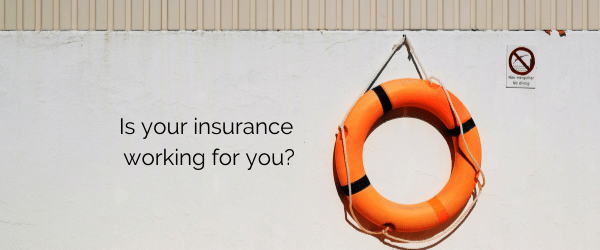Is Your Insurance Working For You?

When was the last time you looked at your insurance coverage? Ideally, the answer to that question is sometimes in the last year. Many of us experienced personal or weather-related disasters in 2020 and early 2021 — and when disaster strikes, we want to make sure we’ve taken every measure to proactively protect ourselves. To accomplish that, we need to review our insurance policies — home, health and auto — annually to ensure they still work for us.
There are three quick steps that should go into your annual insurance reviews:
- Pull up the insurance you currently have. Identify the premium, deductible, and total coverage of your plan.
- Confirm that you can still cover the deductible, and be sure that the total coverage meets your needs. This is an especially important step if anything about your personal, professional or home situation has changed over the course of the year.
- Set a meeting to consult with your insurance agent if you need to make any changes to your coverage or terms. You may also decide to shop around for better options.
Both major and minor life events can change the level of coverage you need. To help your insurance reviews this year, ask yourself the below questions:
- Has the value of your house or its contents changed in a significant way? Making home improvements, seeing an increase in your home’s appraised value, or acquiring items of significant value should be reflected in your policy.
- Have you added a driver (especially a teenager) or removed a driver from your auto insurance policy? Coverage should also reflect a change of vehicle or even change of address.
- Have you added dependents to your household or has the health of a family member changed? A change to insurance can be triggered by job loss, marriage, or divorce. In addition to health and life insurance, you may want to consider a long-term care policy.
As you review each insurance policy, look carefully at your deductibles. If your salary or savings have increased, you may be able to increase your deductibles to reduce your premiums. Also, when looking for ways to save, ask for quotes from several insurers. Make sure the quotes are based on the same amounts and terms.
Let’s look specifically at homeowners insurance. While it doesn’t guarantee your home’s safety or full recovery from an event, home insurance does mean that costs associated with a disaster should not financially ruin you. It’s also not optional: mortgage lenders require a home insurance policy before a home sale is finalized. Depending on the nature of your loan and the size of your down payment, your monthly premium may be bundled with your mortgage payments.
Typical homeowners insurance policies offer coverage for the main structure, additional detached structures, personal property, liability (injury to guests), and additional living expenses incurred in the event of damage to your property. The value of your home and possessions — and your budget — will dictate how much coverage you get in each part of the policy. Standard policies do not cover damage by floods, earthquakes, poor property maintenance, or a number of other perils. If you live in a flood or other hazard zone or are considering purchasing property that could be affected by certain natural disasters, you should investigate your insurance options.
Your Sente Mortgage Banker is highly experienced in assisting borrowers with questions about homeowners insurance and will be happy to help you shop for a policy that fits your needs and budget.
